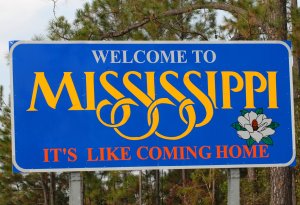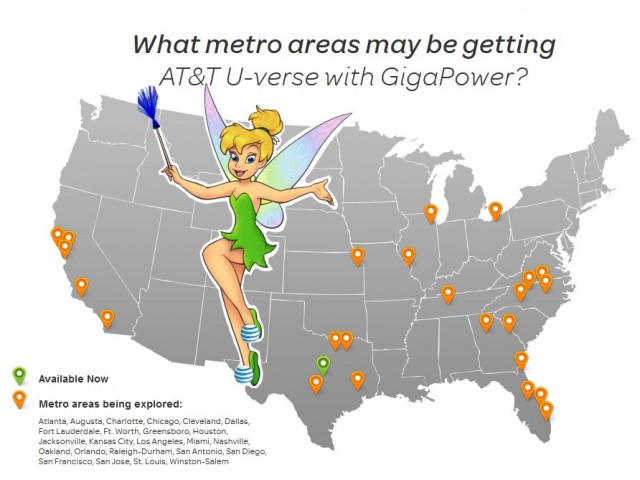Miss. Taxpayers Pay for “Sweetheart Deal” With AT&T; Competitive Bids and Public Scrutiny Prohibited
 AT&T couldn’t have gotten a better deal for itself if it tried.
AT&T couldn’t have gotten a better deal for itself if it tried.
Mississippi state officials that awarded AT&T a 10-year State Master Contract, compelling the majority of state government offices to do business only with AT&T, have just given the phone company an early two-year extension without allowing for any public discussion or competitive bidding.
In 2005, when the contract with AT&T was first signed, it was unlikely most government offices, schools, and libraries would be able to find any bidder other than AT&T. The state contract spells out a series of requirements that critics contend were tailor-written with the full knowledge only AT&T could offer the full menu of required services. Nearly 10 years later, and more than a year before the contract was up for renewal, the state suddenly granted AT&T a two-year contract extension, potentially exposing taxpayers to overpriced, taxpayer-funded broadband services.
Interested members of the public who want to examine the state contract for telecommunications with AT&T have run headlong into a roadblock erected by a Hinds County judge who ruled it was off-limits for public inspection and has since been sealed under court order. To this day, only government customers of Mississippi’s Department of Information Technology Services, the agency in charge of the state government’s broadband, are allowed to see the document.
 The state contract comes at a significant cost to taxpayers if Marvin Adams’ figures are correct. Adams, who works for the Columbia School District, suspects a lot of money has been frittered away because of the lack of competitive bidding. Only the state’s schools and libraries have the option of either securing a contract with AT&T or requesting bids from competitors like Ridgeland-based C-Spire, which supplies fiber and wireless connectivity.
The state contract comes at a significant cost to taxpayers if Marvin Adams’ figures are correct. Adams, who works for the Columbia School District, suspects a lot of money has been frittered away because of the lack of competitive bidding. Only the state’s schools and libraries have the option of either securing a contract with AT&T or requesting bids from competitors like Ridgeland-based C-Spire, which supplies fiber and wireless connectivity.
Adams says AT&T’s contract with the state costs taxpayers $5 per Mbps. But AT&T also charges a “transport circuit charge” of between $10-45 per Mbps. Adams said his colleagues have seen competitive bids averaging $6 per Mbps and the transport circuit charge is included in that price.
The Mississippi Watchdog delivered the understatement of the year when it called AT&T’s contract with Mississippi “lucrative.” Attempts to modify the contract have met with fierce opposition in Jackson, the state capital. Senate Bill 2741, a modest measure that would have compelled school districts to seek competitive bids before signing a multi-year contract with a provider, died in committee earlier this year.
AT&T has close political ties in several southern states. The company co-authored an article with Gov. Phil Bryant and donated at least $42,500 to his various campaigns for political office. In 2012, Bryant signed a bill into law removing most of Mississippi’s remaining regulatory authority over AT&T.
Next door in Louisiana, Gov. Bobby Jindal also maintains close ties with AT&T. The company has funneled more than $250,000 to his wife’s charitable foundation – the Supriya Jindal Foundation for Louisiana’s Children, which also takes substantial contributions from oil and chemical companies, the insurance industry and defense contractors. The New York Times reported back in 2011 that telecom companies like AT&T were increasingly contributing to politically connected charities they could use in campaigns to influence legislation and regulation. Companies can write off their unlimited charitable giving while politicians take credit for the work done by the non-profit groups while also quietly understanding exactly where the money is coming from.


 Subscribe
Subscribe Verizon Wireless’ ongoing campaign to get rid of its grandfathered unlimited data customers continues this week with news the carrier will begin throttling speeds of off-contract customers still hanging on to their uncapped data plans starting Oct 1.
Verizon Wireless’ ongoing campaign to get rid of its grandfathered unlimited data customers continues this week with news the carrier will begin throttling speeds of off-contract customers still hanging on to their uncapped data plans starting Oct 1. “My phone has been throttled and is now essentially unusable for the very things it is marketed for,” reports one customer sentenced by Verizon’s “Network Optimization.” “
“My phone has been throttled and is now essentially unusable for the very things it is marketed for,” reports one customer sentenced by Verizon’s “Network Optimization.” “ If your non-profit or civil rights group feels that part of its core mission is writing letters in favor of a giant cable company’s plans to upsize, we’d like to welcome you to Stop the Cap’s new Alert Your Donor Base program, a free public service from a group that does not accept contributions from corporate donors, big or small. All too often, your love letters have gone unnoticed by your contributors who believed their money was being used to help the needy and downtrodden, not rich corporate executives, shareholders and Wall Street investment banks.
If your non-profit or civil rights group feels that part of its core mission is writing letters in favor of a giant cable company’s plans to upsize, we’d like to welcome you to Stop the Cap’s new Alert Your Donor Base program, a free public service from a group that does not accept contributions from corporate donors, big or small. All too often, your love letters have gone unnoticed by your contributors who believed their money was being used to help the needy and downtrodden, not rich corporate executives, shareholders and Wall Street investment banks. 

 If your non-profit or civil rights group has or is thinking of writing a glowing letter in favor of the merger of Comcast and Time Warner Cable, Stop the Cap! is delighted to announce our new Alert Your Donor Base service. Each time we discover a letter submitted to a state or federal regulator announcing your enthusiastic support for the Worst Company in America marrying the second worst, we’ll be sharing that exciting news, along with any contributions we discover Comcast has sent your way, to your members and supporters.
If your non-profit or civil rights group has or is thinking of writing a glowing letter in favor of the merger of Comcast and Time Warner Cable, Stop the Cap! is delighted to announce our new Alert Your Donor Base service. Each time we discover a letter submitted to a state or federal regulator announcing your enthusiastic support for the Worst Company in America marrying the second worst, we’ll be sharing that exciting news, along with any contributions we discover Comcast has sent your way, to your members and supporters.